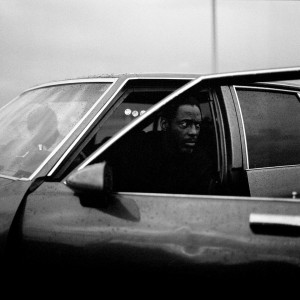 Blue
Caprice is a ponderous and moody dramatization based on the true
story of Army vet John Allen Muhammad (Washington,
Hollywood Homicide)
and Lee Malvo (Richmond, Ray), who would
gain notoriety as the "Beltway Snipers". The two-man
team went on a shooting spree,
killing ten people, in and around the Washington D.C. area during three
weeks in October, 2002. In the film, we see Malvo, a troubled and
abandoned 17-year-old, taken from his home in Antigua by Muhammad,
The elder man claimed him as his son while there with his three natural
(and abducted) children, bringing him back to his home in Tacoma,
Washington.
Blue
Caprice is a ponderous and moody dramatization based on the true
story of Army vet John Allen Muhammad (Washington,
Hollywood Homicide)
and Lee Malvo (Richmond, Ray), who would
gain notoriety as the "Beltway Snipers". The two-man
team went on a shooting spree,
killing ten people, in and around the Washington D.C. area during three
weeks in October, 2002. In the film, we see Malvo, a troubled and
abandoned 17-year-old, taken from his home in Antigua by Muhammad,
The elder man claimed him as his son while there with his three natural
(and abducted) children, bringing him back to his home in Tacoma,
Washington.
However, Muhammad's bitter tirades on victimization and extremely
misanthropic attitudes on American society seep insidiously into the
younger boy's mind. Muhammad's anger is spurred on by a
restraining order he has on him preventing him from knowing the
whereabouts of his children, and this misplaced rage seeped in to the
lad's already apathetic outlook on life. Muhammad exacerbated matters by
perpetually testing the boy's loyalty to him by showing him how to
fight and shoot various kinds of guns -- skills they would use in
Muhammad's mad quest to make American society wake up to the anger
that they, and displaced people like them, have bottled up inside.
The 'blue Caprice' of the title refers to the color and model of the
1990 Chevrolet that the shooters used, hollowed out in the back to
hide the fact that there is a sniper lurking in the trunk, ready to
shoot unseen at random people in his sight. It could also be taken
figuratively, as the 'blue' of the title can signify the sad mood of
the story, and the 'caprice' the sudden changes in their behavior,
lashing out against innocent people seemingly on a whim.
French transplant turned New York-based music video
director Alexandre Moors, working on his first feature film, delivers
a beautifully shot but downbeat depiction of Malvo's
journey from desperately lonely and abandoned child to having a father
figure he can finally look up to. It's a certain recipe for disaster that
this paternal man is an ultra-paranoid psychopath, and expects his
unofficially adopted son to return his love through heinous acts of
violence.
Though Moors' film clocks in
at an economical 93 minutes, there are more than a few lulls in this
tale. The actual killing spree doesn't even occur until the final
twenty minutes, and even then, it is only sketchily depicted (probably
due to budgetary limitations). Not that we need to see graphic details
of the killings to feel the impact, but the slowness by which the
films up makes the shortness of the actual act feel like it is given
short shrift comparatively.
Though we can glean the gist of his anger,
Blue Caprice doesn't delve particularly deeply into the
psychology of either of these men, to the point where we can watch
their descent into madness, but we're disconnected to the
understanding of their mental condition. Is it a sheer random act of
violence, is it an orchestrated act of malevolence, or is it the
result of deep-seated mental illness? What turns these men into
monsters? We are left only to speculate.
While its lack of
emotional resonance is a bit disappointing, Blue Caprice
garners a recommendation as a film primarily due to Moors' curiously
detached, impressionistic sense of style, which is somber and
contemplative, as well as the smoldering, mostly improvised acting by
Isaiah Washington, who infuses the manipulative Muhammad with an inner
rage and self-righteous anguish that permeates every fiber of his
being, like a long fuse that inches ever closer to certain
explosiveness with each passing day. Richmond, as Malvo, isn't as
defined, perhaps intentionally, serving as that blank slate for
Muhammad to paint in with his own warped vision, that empty vessel
into which he can pour all of his hate, anger and rage.
Though Moors
offers up mood in place of facts, and abstraction in place of action,
Blue Caprice emerges as a chilling mood piece that posits that there is sometimes a
senselessness to trying to force a rationale on cancerous acts of evil
intent.

 Blue
Caprice is a ponderous and moody dramatization based on the true
story of Army vet John Allen Muhammad (Washington,
Blue
Caprice is a ponderous and moody dramatization based on the true
story of Army vet John Allen Muhammad (Washington,